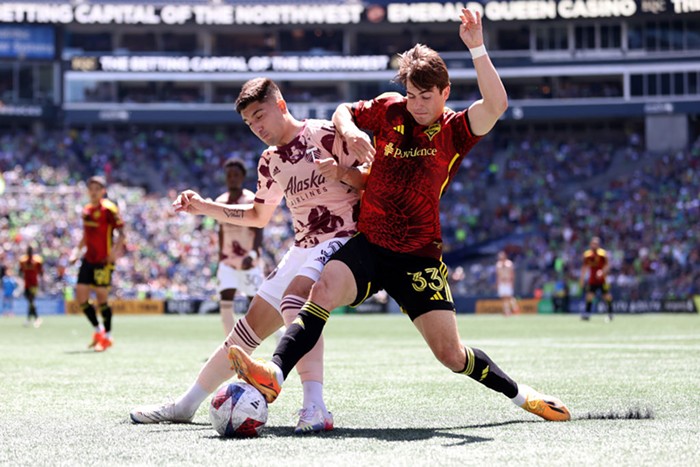
- David Blair/Portland Timbers
Do you remember how good Donovan Ricketts was in 2013?
The Timbers goalkeeper won the MLS "Save of the Week" 10 times. He won MLS Goalkeeper of the Year. He made miraculous saves, tying together a back-line that churned through five starting center-backs and reeled off clean sheets late in the season behind a defense of four players that would all be replaced less than a half year later.
Who was the most important player in that season? It was absolutely Ricketts. He saved points left and right, scrubbing away goals and winning over a fan-base that originally saw him as one of the most brazen and inept symbols of the Gavin Wilkinson era of terror.
What he really was, was the symbol of the Timbers' turnaround under Caleb Porter. Porter's first personnel call after being named manager in summer 2012 was to sign off on the trade that sent fan favorite Troy Perkins to Montreal in exchange for Ricketts, whose best days appeared to be behind him at the time.
Porter wanted a big goalkeeper, both in physical stature and mental fortitude. It was a masterstroke. Perkins' career has flamed out amidst a cloud of acrimony and frustration, while Ricketts became a Timbers legend in his own right. Ricketts is a study in contrasts—as quiet and kind off the field as he was fierce and intimidating on it.
Ricketts is an old-school goalkeeper in style. In an age of sweeper-keepers and athletic soccer players changing the position, Ricketts has never had very many components to his game. He just stopped a hell of a lot of shots. His frame and wingspan certainly helped. So did fantastic reflexes. Ricketts was exceptionally quick at getting to ground to deny headers at close range, and beating him with anything directed at the upper third of the net has always been a hopeless exercise.
Because he made he made some of the peripheral aspects of goalkeeping look so ugly and trying, and because of his age and resumé before coming to America, Ricketts has always been slightly under-appreciated in the grand scheme of the MLS goalkeeping landscape. It's hard not to chuckle at the irony that one of the best words to describe Ricketts is rickety, but his well-documented fragility has often made him into a punchline that has detracted ever so slightly from a truly remarkable career.
One US Soccer writer told me when Ricketts was with the LA Galaxy that he was the best pure goalkeeper in the history of CONCACAF, and while it's hard to go that far, it's not hard to say that Ricketts—with an MLS Cup, two Goalkeeper of the Year awards, and plenty of other accolades—has been one of the best goalkeepers in league history. Of course, at 37, Ricketts is no longer at his best. That's why few Timbers fans were too upset—and why Timbers management hardly blinked—at replacing Ricketts with Ghanian 'keeper Adam Larsen Kwarasey for 2015 and beyond.
On paper, the move makes plenty of sense. Kwarasey is a much younger, more modern goalkeeper. He has played in the World Cup, and figures to be in Portland long-term. But he has big shoes to fill. Because when Ricketts was in Portland, he was lights-out. An eraser.
2014 was trying for the Timbers entire organization, but especially their defense. But considering the shambolic back-line he had to play with, Ricketts didn't do poorly at all. He tacked on several more sensational saves and kept the Timbers in game after game; there was a reason why Portland was always within striking distance for their trademark late equalizers. It was just that with all the goals that were going in, few noticed the ones that didn't go in.
Ricketts was able to win Portland over first and foremost with his phenomenal play, but also importantly with his class and professionalism. Never as flamboyant or outspoken as his Great Wall of Gambia mates Futty Danso and Pa Modou Kah, Ricketts was ultra-reliable and far more consistent. You always knew what you were going to get from him. It was impossible not to respect Ricketts for how he carried himself: head down, with a sneaky sense of humor lurking just beneath his steely front.
Ricketts was only in Portland for two and a half years, and his achievements in goal are only more magnified when you look at the defenders in front of him, a list that included Kah, Futty, David Horst, Danny O'Rourke, Raushawn McKenzie, Kosuke Kimura, Ryan Miller, early Alvas Powell, and Andrew Jean-Baptiste. By the numbers, Ricketts' best season as a pro, 2013 at age 35, was near-miraculous. In context, it's even more incredible.
It was time for the Timbers and Ricketts to part ways. But the Iron Lion's role in Portland's revival should never be overlooked. There's no Western Conference title without Ricketts. If Ricketts wasn't around, the fish would have gutted Portland in October 2013, not the other way around.
Troy Perkins got the biggest reception ever for an opposing player when he returned to then Jeld-Wen Field as a Montreal Impact player in the second game of the 2013 season. Part of that response from the Timbers Army was purely to acknowledge Perkins' contributions to the Timbers, but part of it was also directed at Wilkinson as the GW Out campaign of 2012 smoldered out with a final pop.
Ricketts won his first Timbers Save of the Week in that Impact game, and after it was over, he would win the award five more times before the Timbers lost again.
The point is this. Perkins' reception? When Ricketts takes the pitch on Sunday afternoon, he should get a response twice as big: As big as he was in goal for the Timbers.
















